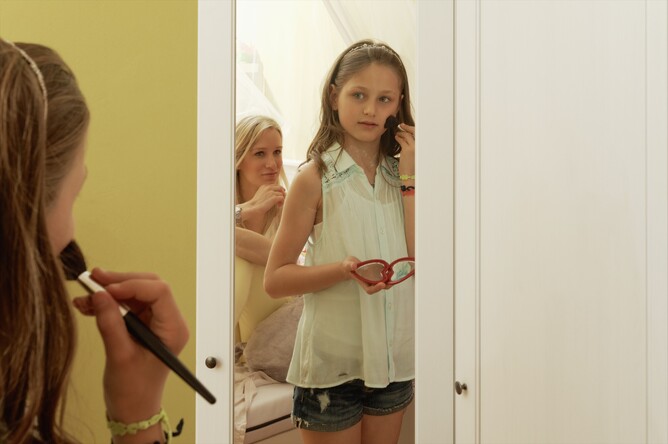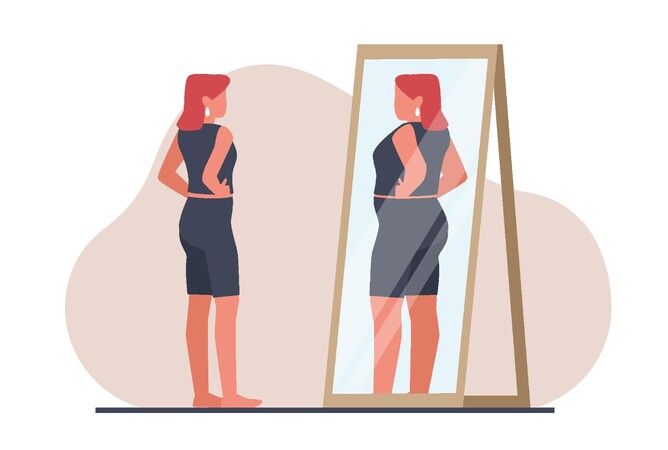A Guide for Carer's, what to avoid and what can help
In today's society, young people are bombarded with unrealistic beauty standards and pressures to conform to certain visual ideals, leading to low self-esteem and body dissatisfaction.
Reading on we'll explore the potential causes of low self-esteem with body image and provide practical ways to support and counter these negative influences. Additionally, we'll consider dialogue to avoid and positive affirmations to promote healthy body image in teens.
Sometimes it’s uncomfortable to admit it’s lovely to see someone, or when it’s not! Or maybe you don’t really know them that well or see them too often. It can become normal and tempting to comment on appearance when socialising intentionally or by chance. Because we can quickly think first about what we see in that moment and are drawn to something easier, especially if there’s some initial excitement or other anxieties occurring.
How comfortable are children and young people with their bodies do you think?
Actually the numbers are quite sobering.
According to the UK Mental Health Foundation (MHF), exact estimates vary, depending on how body image is measured, concerns and worries about appearance are commonplace among young people.
One survey MHF mentions, is of 11–16-year-olds in the UK by ‘Be Real’ found that 79% said how they look is important to them, and over half (52%) often worry about how they look.
In MHF’s own survey of young people aged 13–19, 35% said their body image causes them to ‘often’ or ‘always’ worry.
At TMH we believe it's pretty important to address this. First, what can cause problems with how children of any age view themselves and their bodies?
Listening to patients, it's often the little comments shared, not just the big ones that can have a significant impact. So we thought it was worth while going through quite a few examples. Think to yourself, have you heard these yourself? How did it make you feel? Have you found yourself saying some of the below or similar? If you have, don't beat yourself up about it, there's lot's of reasons why we might make these comments. But now you know the harm they can cause and we hope this will help you find other options
These examples below also come with some perspectives why these comments can be damaging to children and vulnerable people: Most of us have heard something like the below, some more than others.
Remember, saying it once can be enough to cause harm and damage one’s self-esteem.
1. Criticising their weight or size: "You've gained a lot of weight recently. Maybe you should cut back on snacks". "Don’t you eat?"
- Criticising a child's weight or size can contribute to body shame and low self-esteem. It reinforces the idea that their worth is tied to their appearance, leading to negative body image and potential disordered eating habits.
2. Comparing them unfavourably to other family members or peers: "Why can't you be more like your cousin"?-"She's so much thinner than you because she’s more active."
- Comparisons to others can create feelings of inadequacy and inferiority, damaging self-esteem. It sends the message that they are not good enough as they are and need to change to meet unrealistic standards of beauty.
3. Making negative remarks about specific body parts: "You should cover up your arms, they look flabby/like match sticks."
- Negative remarks about specific body parts can instil shame and insecurity about their appearance. It teaches children to focus on perceived flaws rather than embracing their bodies with acceptance and self-love.
4. Commenting on changes in their body shape or size: "What shape are you trying to be?" “Getting a bit lanky…”
- Comments about changes in body shape or size can foster body dissatisfaction and contribute to disordered eating behaviours. It reinforces the harmful belief that one's value is determined by their physical appearance.
5. Using derogatory terms or nicknames related to their body: "Look at those thunder thighs! Maybe you should skip dessert." “Look at those stick legs poking through your shorts!”
- Derogatory terms or nicknames related to the body can lead to feelings of shame and self-hatred. It perpetuates negative body image and can have long-lasting psychological effects.
6. Pressuring them to diet or lose weight: "You should go on a diet. You'd look so much better if you lost/gained some weight."
- Pressure to diet or lose weight can contribute to disordered eating behaviours and negatively impact self-esteem. It sends the message that their worth is tied to their weight or appearance, rather than their inherent value as a person.
7. Making assumptions about their eating habits or exercise routine: "I bet you eat junk food all the time.”
- Making assumptions about a child's eating habits or exercise routine can lead to feelings of shame and guilt. It reinforces stereotypes and perpetuates harmful attitudes towards food and exercise.
8. Praising weight loss or commenting on their body when they've lost weight: "Wow, you look so much better now that you've lost weight. Keep it up!"
- Praising weight loss reinforces the idea that thinness is equated with beauty and success. It can encourage unhealthy weight loss behaviours and contribute to disordered eating patterns.
9. Making comments about their clothing size: "Do you really need to buy clothes in such a big size? Maybe you should try something smaller."
- Comments about clothing size can reinforce unrealistic beauty standards and lead to feelings of inadequacy and shame. It teaches children to prioritise appearance over comfort and self-expression.
10. Comparing them to unrealistic standards of beauty: "you could be a model if you ate better."
- Comparing children to unrealistic standards of beauty can erode self-esteem and lead to body dissatisfaction. It reinforces the harmful belief that they need to change their appearance to fit societal ideals.
11. Shaming them for eating certain foods or enjoying treats: "You're eating another cookie?” “Just an apple for lunch!”
- Food shaming can create an unhealthy relationship with food and lead to disordered eating behaviours. It instils guilt and shame around eating, rather than promoting a balanced and intuitive approach to nutrition.
12. Making comments about their height: "Why are you so short? You should have grown taller by now." “Stop growing, you look like an adult already”.
- Comments about height can lead to feelings of inadequacy and insecurity. It reinforces the harmful belief that one's worth is determined by physical attributes beyond their control.
13. Insulting their physical abilities or athleticism: "You're so clumsy. No wonder you can't keep up with the other kids."
- Insulting physical abilities can damage self-esteem and discourage children from engaging in physical activity. It reinforces negative beliefs about their capabilities and undermines their confidence.
14. Labelling them as "too fat" or "too skinny": "You're too fat to wear that. You should cover up more." “That doesn’t work with your skin colour”. “What about your stretch marks showing?”
- Labelling children based on their body size or appearance perpetuates body shame and reinforces harmful stereotypes. It can lead to disordered eating behaviours and psychological distress.
15. Ignoring or dismissing their concerns or feelings about their body image: "Stop being so sensitive. It's not a big deal if you're a bit chubby." “Being thin as hardly a curse!”.
- Ignoring or dismissing a child's concerns about their body image invalidates their feelings and experiences. It can lead to feelings of isolation and further exacerbate body dissatisfaction.
These examples illustrate how unnecessary or maybe to some seemingly innocent comments can have a significant impact on a child or teen's self-esteem and body image. It's essential for parents and caregivers to be mindful of their words and the messages they convey about body image and self-worth.
It’s not just language and words that can cause Low Self-Esteem with Body Image:
There’s many reasons anyone can begin to see themselves differently, and not in a positive light. But let's take a moment first to think more what this can look or fee like day-to-day for someone with these struggles.
Consider this, when self-esteem is low, and body image is burdening someone's mind, especially a child, it can be very tiresome because they're probably thinking about it more than they realise. In someone's day, in relation to their body image, they may wake up and fall asleep thinking about related worries. All these thoughts, can be actively ongoing, and that takes time and energy from people.
'What can I wear that will be comfortable/fit' / 'What should I eat then, later, tomorrow' / 'I'm hungry but I can't' / 'I'll breath in all day' / 'I can/I must work this off later' / 'oh no, I'm bloated' / 'Can't eat that in front of them' / 'Do I have enough food at home' / 'How am I going to avoid eating then' / 'I can skip this meal' / 'Why are the looking at me' / 'I'll get changed at home, not changing rooms' / 'How else can I lose this weight'
Can you empathise with this?
So if it's not just negative comments, what other factors can contribute to insecurities with a child's body image and self-esteem?
Media Influence: Teens are constantly exposed to idealised images of beauty in the media, leading to comparisons and feelings of inadequacy.
Peer Pressure: Negative comments or teasing from peers about appearance can significantly impact a teen's self-esteem and body image, but this isn’t always in person. It can be from online, via messaging and various other forms of bullying.
Family Dynamics: Criticism or comments about weight or appearance from family members can contribute to low self-esteem and body dissatisfaction. But also modelling poor or unhealthy behaviours or exposing to more adult online content or experiences. From social media choices to our own eating, exercise or social habits we can be influencing children forgetting their sponge like capabilities to absorb things from us.
Personal Experiences: Traumatic events or experiences, such as bullying or sexual harassment, can impact a teen's perception of their body and self-worth. It can also be about trying to control something they feel they are able, when autonomy is lacking or events outside of their control have occurred that does not relate to food or body image.
Ways to Support and Counter These Reasons:
Media Literacy: Encourage critical thinking about media messages and help children and teens understand that many images are edited or unrealistic representations of beauty.
Positive Reinforcement: Compliment children and teens on their talents, personality traits, and achievements rather than focusing solely on appearance. We can find it easier to comment on what we, see but look a little further.
Healthy Habits: Emphasise the importance of balanced nutrition, regular exercise, and self-care for overall well-being rather than solely focusing on weight or appearance. Positive modelling and examples around your children might look like “I have an active day today, I better make sure I have a sufficient lunch to keep me going” While preparing a balanced lunch.
Open Communication: Create a supportive environment where children and teens feel comfortable discussing their feelings about body image and self-esteem. Listen actively and validate their experiences without judgment.
Seek Professional Help: If a teen is struggling with body image issues or low self-esteem, consider seeking support from a qualified therapist or counsellor who specialises in eating disorders or body image concerns.
Positive Affirmations:
If you’re finding yourself or others saying negative comment often, maybe it’s time to find something kinder to say or hear. There's various options for help to get you to thinking about why, but it can help to be able to say things like following no matter her odd it feels to do so at first;
· "You are/I am so talented and creative."
· "I love your/my unique sense of style."
· "You/I have a kind and compassionate heart."
· "You're/I’m strong and capable of achieving anything you set your mind to."
· "You/I’m are worthy of love and respect just as you are."
· “I/you can get there doing, one thing at a time”
Promoting positive body image in children and teens is crucial for their mental and emotional well-being. By addressing potential causes of low self-esteem with body image and providing support and countermeasures, parents and caregivers can help teens develop a healthy relationship with their bodies and cultivate self-confidence and self-love. Remember, your words and actions have a powerful impact on shaping your teen's body image and self-esteem, so choose them wisely and always prioritise kindness and compassion.
What can you say if you feel a pull to comment on someone’s appearance?
Other than resist the urge, you could try responses such as;
· "You seem to be taking good care of yourself”
· “Tell me what’s happening with you?"
· “Have you kept well?”
· "I've noticed you're embracing some changes, and it's great to see you feeling confident."
· "It's wonderful to see you"
These are less likely to raise eyebrows or hurt feelings. But still, it’s tricky ground to express such concern, particularly when it’s a child. Whilst it's natural to want to acknowledge changes in someone's appearance, it's important to do so in a respectful and supportive manner.
The first, and likely best thing to do, is to get used to not commenting on appearance at all unless there’ legitimate health and wellbeing reasons. Even positive comments could incidentally promote unhealthy habits or traits. Find a general welcome or other small talk topic to focus on. The more you do it, the more natural it becomes.
Sometimes, the best approach is to focus on the person's overall well-being and happiness rather than commenting directly on their appearance. Offering compliments or observations that emphasise their personality, confidence, or positive energy can be uplifting without placing undue emphasis on their body.
Ultimately, showing care and appreciation for the individual beyond their physical appearance fosters a more meaningful and supportive connection.
Promoting positive body image among children and teens is crucial for their mental and emotional well-being. It’s important to address the harmful impact of unrealistic beauty and fitness/physical standards and provide support to counteract negative influences.
By fostering media literacy, offering positive reinforcement, encouraging healthy habits, promoting open communication, and seeking professional help when needed, parents and caregivers can help teens develop a healthy relationship with their bodies and cultivate self-confidence and self-love.
Remember, words and actions have a powerful impact, so always prioritise kindness and compassion when discussing body image.
Thank you for reading
TMH



